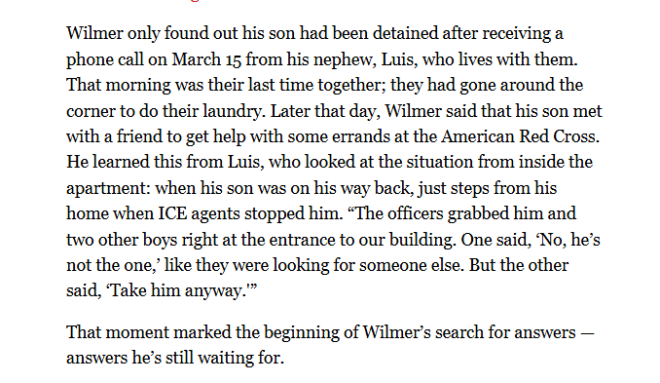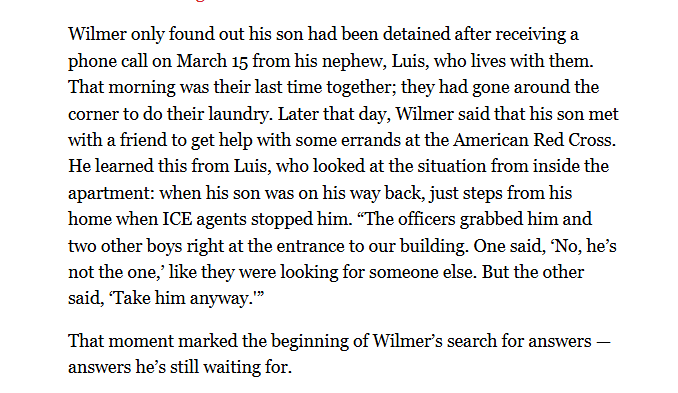
Summary of the deportation Incident Involving a Venezuelan Teen
In a disturbing revelation, recent reports from DocumentedNY have shed light on the controversial actions of U.S. Immigration and Customs Enforcement (ICE) regarding a Venezuelan teenager. This incident has sparked widespread outrage and raised critical questions about the immigration enforcement practices in the United States. The case centers around a 19-year-old Venezuelan who was deported to El Salvador despite having no criminal record and being mistakenly identified during an ICE operation. The implications of this case extend beyond the individual, highlighting systemic issues within immigration enforcement.
Overview of the Incident
The incident came to public attention through a tweet by immigration attorney Aaron Reichlin-Melnick, who shared the details of the case. The young man, who has no tattoos and a clean legal record, was not the intended target of the ICE operation that led to his arrest. In fact, an ICE agent reportedly acknowledged the mistake, stating, "He’s not the one" when the teenager was apprehended. This statement underscores the troubling reality that innocent individuals can become victims of aggressive immigration enforcement policies.
The Broader Context of Immigration Enforcement
The deportation of this Venezuelan teenager is not an isolated incident; it reflects a broader pattern of immigration enforcement that can often lead to wrongful arrests and deportations. Critics of ICE have long argued that the agency’s tactics can be indiscriminate, often resulting in the detainment of individuals who pose no threat to society. This case serves as a poignant example of how these practices can disrupt the lives of innocent people and their families.
The Impact on the Individual and the Community
For the young Venezuelan man, the repercussions of this wrongful deportation are significant. Being sent to a country he may not have any ties to can lead to feelings of isolation, fear, and uncertainty about his future. The trauma of being separated from family and friends, coupled with the stigma of deportation, can have lasting psychological effects. Moreover, it raises concerns about the safety and well-being of individuals who are deported to countries facing their own socio-political challenges.
- YOU MAY ALSO LIKE TO WATCH THIS TRENDING STORY ON YOUTUBE. Waverly Hills Hospital's Horror Story: The Most Haunted Room 502
A Call for Reform
This incident has reignited calls for reform within the immigration enforcement system. Advocates argue that there needs to be a more robust system in place to prevent wrongful arrests and ensure that individuals are treated fairly and justly. Supporters of immigration reform emphasize the importance of due process and the need for policies that prioritize human rights over punitive measures.
The Role of Advocacy Groups
Organizations dedicated to immigrant rights are mobilizing in response to this incident. They are working to raise awareness about the systemic issues within ICE and advocating for legal protections for vulnerable populations. The role of these advocacy groups is crucial in shedding light on the injustices faced by immigrants and pushing for policy changes that address the root causes of these issues.
Public Reaction and Media Coverage
The public reaction to this incident has been one of outrage and empathy. Social media platforms have become a space for individuals to voice their concerns and share their stories, amplifying the message that immigration enforcement must be re-evaluated. Media coverage has also played a vital role in bringing attention to this case, encouraging discussions about the implications of deportation policies and the need for accountability within ICE.
Future Implications
As the conversation around immigration enforcement continues to evolve, the case of this Venezuelan teenager serves as a reminder of the human impact of policy decisions. It underscores the necessity for comprehensive immigration reform that prioritizes the dignity and rights of individuals, regardless of their immigration status. The incident may prompt lawmakers to reconsider existing policies and take steps toward creating a more just and humane immigration system.
Conclusion
The deportation of a 19-year-old Venezuelan to El Salvador, despite having no criminal record and not being the target of an ICE operation, highlights critical flaws in the U.S. immigration enforcement system. This case serves as a wake-up call for policymakers, advocates, and the general public to address the urgent need for reform. As discussions surrounding immigration policies continue, it is essential to center the voices and experiences of those directly impacted by these policies, ensuring that the rights of all individuals are upheld and protected.
In summary, this incident not only reflects the challenges faced by immigrants but also calls for a reevaluation of the practices employed by immigration enforcement agencies. By advocating for change and holding agencies accountable, society can work towards a more equitable immigration system that values human dignity and justice.

NEW: @Documentedny reports that one of the Venezuelans deported to El Salvador is a 19-year-old with with no criminal record and no tattoos who wasn’t even the target of an ICE operation — but ended up sent there anyway. An ICE agent even said “He’s not the one” when arrested! pic.twitter.com/GfiuUFydtP
— Aaron Reichlin-Melnick (@ReichlinMelnick) April 14, 2025
NEW: @Documentedny Reports That One of the Venezuelans Deported to El Salvador Is a 19-Year-Old with No Criminal Record and No Tattoos Who Wasn’t Even the Target of an ICE Operation — But Ended Up Sent There Anyway. An ICE Agent Even Said “He’s Not the One” When Arrested!
This story shines a light on the complexities and often harsh realities of immigration enforcement in the United States. Recently, the situation surrounding a 19-year-old Venezuelan has raised eyebrows and sparked conversations about the fairness of deportations. The young man, who has no criminal record and no tattoos, became a victim of an ICE operation that wasn’t even targeting him. Imagine being in his shoes—arrested and sent away, despite being innocent of any wrongdoing.
The Background of the Case
The case was reported by Documented NY, highlighting the story of this young Venezuelan. He was among those deported to El Salvador, a country he likely has little to no connection to, especially given his age and background. The fact that he wasn’t the intended target of the ICE operation raises serious questions about the methods used in immigration enforcement.
What makes this situation particularly troubling is that an ICE agent reportedly stated, “He’s not the one,” during the arrest. This admission not only underscores the chaotic nature of such operations but also illustrates a troubling disregard for due process and individual rights. How can such mistakes happen, and what does it mean for those caught in the crossfire?
The Human Impact of Deportations
Deportations can have devastating effects on individuals and families. For this young man, being sent to El Salvador means being uprooted from his life in the U.S. He faces the uncertainty of starting over in a country that might feel completely foreign to him. Many immigrants share similar stories—caught up in a system that often prioritizes enforcement over empathy.
Consider the psychological toll this takes. Many deportees report feelings of isolation, fear, and despair. They may leave behind family members, friends, and a support system that is vital for their well-being. It’s not just about the legal implications; it’s about lives being disrupted and futures being altered in an instant.
The Broader Context of ICE Operations
This incident isn’t isolated; it reflects a broader trend in immigration enforcement that has been criticized for its lack of accountability. ICE operations often focus on rounding up individuals without proper vetting, leading to cases like this where innocent people are swept up in the process.
Many argue that these operations disproportionately affect vulnerable communities, including immigrants from Latin America and other regions. Critics of ICE frequently point out that the agency’s tactics can be heavy-handed, raising concerns about racial profiling and the ethics of deportation practices.
Legal Implications and Rights of Immigrants
When discussing deportations, it’s essential to understand the legal framework that governs these actions. Immigrants have rights, even if they are undocumented. The U.S. legal system provides certain protections, but navigating this system can be complicated, especially for individuals who are not familiar with the laws.
This young man’s case raises important questions: What rights do immigrants have when they are arrested? How can they defend themselves against erroneous deportations? Legal assistance is crucial, yet many immigrants lack access to adequate legal representation. Organizations like the American Civil Liberties Union (ACLU) and various immigrant rights groups work tirelessly to advocate for individuals facing deportation and to challenge unjust practices within ICE.
The Role of Advocacy and Community Support
In situations like this, community support and advocacy can make a significant difference. Grassroots organizations often rally to provide resources and assistance to those affected by deportations. They help immigrants understand their rights and navigate the often-complex legal landscape.
Moreover, public awareness campaigns can play a vital role in changing perceptions about immigration. By sharing stories like that of the 19-year-old Venezuelan, advocates can humanize the issue and call for more humane policies. It’s crucial for communities to come together to support immigrants and to push for reforms that prioritize justice and compassion over punitive measures.
Looking Ahead: The Future of Immigration Policy
As the conversation around immigration continues to evolve, it’s essential to consider the implications of policies on real people. The story of this young Venezuelan is a reminder that immigration enforcement can have profound effects on individuals and families. It calls for a reevaluation of how we approach immigration in the U.S.
Advocates are calling for changes that would prevent situations like this from occurring in the future. This includes pushing for clearer guidelines for ICE operations, better training for agents, and increased oversight of deportation practices. The goal is to create a system that respects human rights and ensures that individuals are treated fairly, regardless of their immigration status.
Conclusion: A Call for Compassion and Justice
The plight of the 19-year-old Venezuelan deported to El Salvador serves as a poignant reminder of the human side of immigration policy. As communities and advocates rally to support individuals caught in the crosshairs of immigration enforcement, it’s crucial to keep pushing for policies that reflect compassion and justice. Every story matters, and each individual deserves to be treated with dignity and respect, regardless of their immigration status.
For those interested in following developments in immigration policy and supporting those affected, staying informed and engaged is key. Whether through advocacy, sharing stories, or simply educating oneself about the complexities of immigration, every effort counts in the fight for justice and humanity.
